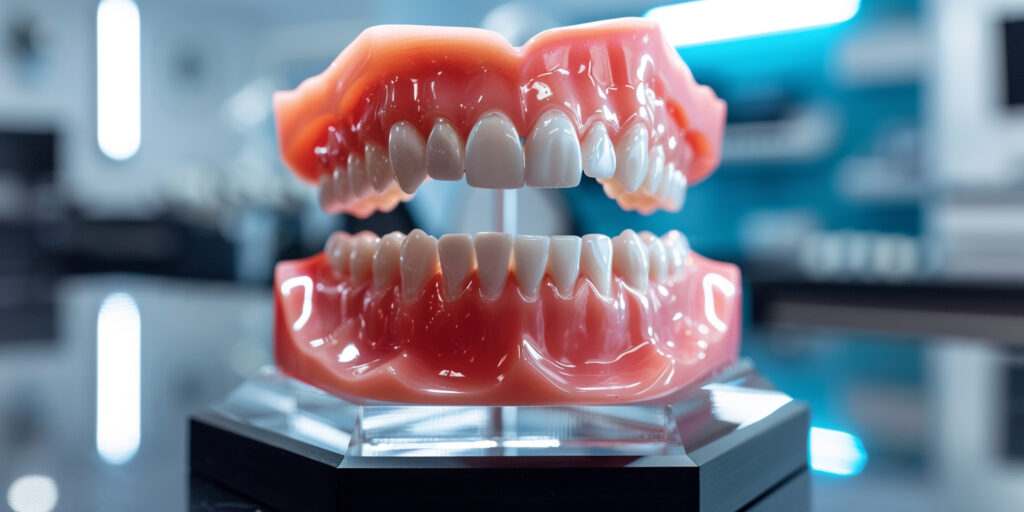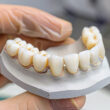A full-mouth dental implant is the gold standard of tooth replacement. It is purpose-made for those missing several teeth that may have gotten damaged, unhealthy, or unnaturally aligned. It is a life-changing cosmetic procedure for restoring function and aesthetics to the smile, but it can cost an arm and a leg.

Not surprisingly, most dental insurance plans don’t provide coverage for dental implants—whether partial or full—and for seemingly good reasons, too. For one, the typical dental implant has a high cost. Often, the procedure runs into tens of thousands of US dollars, a fee that is beyond the reach of the typical patient paying out of pocket.
More importantly, insurers, for the most part, consider a dental implant a cosmetic rather than a restorative procedure and thus elective.
Nevertheless, we will attempt to provide in-depth details on what full mouth dental implants cost with insurance, including some factors that impact the cost.
What Are Involved in Full Mouth Dental Implants?
It’s important that you fully understand the nature of a full mouth dental implant procedure before considering its cost implications. Generally, the procedure involves the complete replacement of some or all of the natural teeth of the dental patient. It takes place in two stages. In the first stage, the dental surgeon places multiple implants into the jawbone.
These implants act as artificial roots to support the customized denture—partial or full set of teeth—that will be placed in the second stage. Most full-mouth dental implant procedures require that 12 to 16 implants in total be placed in both the upper and lower jaws.

When you decide to fully replace your set of teeth with dental implants, you are taking a decision that is both physically and financially daunting. Yes, the procedure is life-changing for your oral health, dental function, and aesthetics; but the cost is high. Thus, it is important that you understand what factors impact the cost for the procedure and how insurance coverage potentially reduces this cost so that you can make informed decisions.
Also read: Is Dental Bonding Covered by Insurance?
Top Factors That Impact Full Mouth Dental Implants Cost?
There are several; we will highlight the most important ones:
- Number of implants required: The number of dental implants that will be placed in your jaws depends on the structure of your jawbone and your implantation goals. Generally, the more implants your procedure requires, the higher your cost for the procedure gets.
- Will there be bone grafting and/or sinus lift?: Bone grafting and sinus lift are sub-procedures done to enhance the jawbone’s ability to support the weight of the implants. One or both are done, as required, on a case-by-case basis when your jawbone does not have the required density to support the weight of the implants to be placed.
- Implant materials to be used: This factor speaks to the quality of the implant material that will be used for the procedure. The higher the quality of the material, the more the cost outlay will be. For instance, titanium is the most common implant material and is less expensive than zirconia, another implant material that is of higher quality.
- What type of restoration is being done: Clearly, the type of restoration to be done—denture or bridge—will dictate the type of materials to be used and thus impact the cost of the procedure.
- Where is the procedure going to be held?: The geographical location of the dental practice where the procedure will be held also impacts the cost of the procedure. Generally, the cost tends to be higher in dental practices located in urban areas when compared to their counterparts in the rural areas.
- The experience and expertise of the dental surgeon: The cost for your proposed procedure will be proportionately as high as the experience and expertise of your dental surgeon.
Dental Implant Without Insurance Cost
The cost of a dental implant depends on the materials and sub-procedures that will be utilized to achieve the restoration you desire. The following is a list of the line items that make up the cost of dental implants:
- Implants:
Just as we mentioned earlier in this article, the number of implants to be used for your proposed procedure will affect your cost outlay. On the average, a titanium implant costs US$3,500 each. The typical full mouth dental implant procedure will gulp at least 10 of these; so that the total cost for implants will be in the region of US$35,000.
- Bone Grafting and Sinus Lift:
If your dental surgeon deems it fit to include one or both of these sub-procedures, then be prepared to fork out at least US$3,000 for each.
- Abutments and Crowns:
These are the screw-like materials that help hold the implants to your jawbone and also connect the denture or bridge being implanted to the implants on your jawbones. One set of abutments and crowns will be used for one tooth, and each cost about US$1,500.
In total, you can expect to spend at least US$61,000 on a proposed full mouth dental implant if you are doing so without insurance coverage. This estimated total already includes an estimated US$5,000 professional fee for the dental surgeon and auxilliary staff that will perform the procedure.
Do note that this cost is estimated and the actual may vary with factors like increasing case complexity, quality of materials you choose to use and whether or not additional procedures will be required.
Also read: How to Get Dental Implants Covered by Medical Insurance
What Will Full Mouth Dental Implants Cost With Insurance?
It’s quite difficult to determine the exact cost of full-mouth dental implants with insurance. This is because many technicalities weigh in on dental insurance coverage. For example, dental insurance plans, benefits, and costs vary from one region to the other and even among insurers in the same region.

The total cost of full mouth dental implants can range from $60,000 to $90,000 without insurance. So, you can expect insurance to cover a portion of the cost, typically between 50% and 80%. However, this depends on your specific plan.
Some pointers to how much your insurer could cover include:
- Your annual maximum: What is the absolute maximum your insurer will pay for your dental care in a given year?
- Your deductible: What is the maximum out-of-pocket payment required by your plan before insurance kicks in?
- Your co-pay: What fixed amount do you pay for each dental service you access under your plan?
- Your policy’s coinsurance: What is the percentage of the cost of accessing dental care that you share with your insurer?
These are the most important factors to consider when calculating what full mouth dental implants cost with insurance. It’s best practice to always review your dental insurance policy carefully with your provider before making a decision about your proposed procedure.
Going Beyond Dental Insurance
If your insurance is unable to cover the cost of your implant or at least a decent portion, there are some other options you can consider to get your procedure done.
- Full Mouth Dental Implants Financing: Several dental practices will offer you a payment plan in addition to your insurance coverage in order to make the procedure cheap for you.
- Access a Dental Savings Plan: A lot of these plans in the marketplace offer discounted dental care—including full mouth dental implants—when you subscribe.
- Limit the Number of Implants to be Used: As you know, the number of dental implants to be used is a big factor in the overall cost of the procedure. You might want to consider reducing the number of implants to be used in order to reduce your overall cost; after all, the full-mouth dental implant is an elective procedure.
Conclusion
There are a number of factors that play into full mouth dental implants cost with insurance. However, you can hedge your bet by consulting with a qualified dental surgeon to weigh in on your options and advise you accordingly. A good dental surgeon will check your oral health, explore treatment options with you, and key you in on detailed costing for the procedure.
In the end, the long-term rewards of a successful dental implant far outweigh its cost. If you carefully consider what treatment options are available for your budget and maybe factor in some financing, you can actually achieve that total smile makeover you desire.









